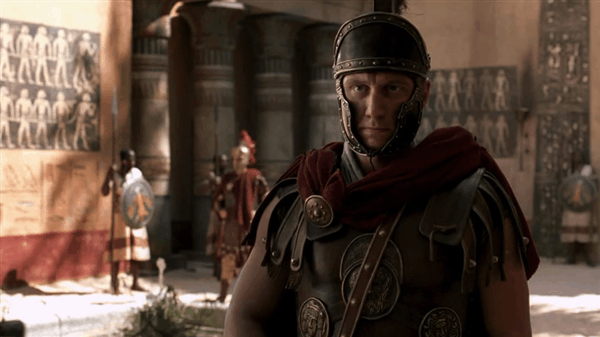Sometimes teaching a freshman-level college course feels like a game of Chinese Whispers. I give the students the information, but the information isn’t the same when I grade their exams. Some of the words are recognizable, but the message got lost. I’m pretty sure that this results from trying to cram thousands of years of history into one study session the night before the exam. The product of these all-night cramming sessions can sometimes be startling and amusing.
Here is a sample of statements in exams and essays from my sections of “Western Civilization I” for the 2014–2015 academic year, along with my reactions.
1. “Ziggurat was a Pharaoh.”

Actually. Pharaoh is Pharaoh. Ziggurat is a building.
2. “The Code of Hammurabi was a set of rules the Sumerians had to follow by that was written by Jesus.”

Even though I teach at a Baptist university, the answer isn’t always Jesus.
3. “Greece’s civilization was different I believe but I don’t remember much about it.”

Then you won’t mind if you don’t get many points.
4. “The genocide of an entire island is not hospitable.”

Um. Yeah.
5. “The Athenians were one of the most tactile and intelligent warriors.”

I don’t think that means what you think it means.
6. “Alexander the Great wasn’t he in the first triumvirate? Or was he the emperor?”

Believe it or not, your professor is looking for answers.
7. “The thing that sparked the fall of the Roman Republic was when they allowed Athens in their land (aka Germans).”

So much wrong.
8. “Hannibal is the first person to create the books for bibles because it used to be big pages they would have to flip through.”

If the answer’s not Jesus, try the Bible.
9. “Julius Caesar’s biggest victory as a hero was that he was assassinated, leaving people shocked.”

Fascinating.
10. “Nero was a Roman philosopher who formulated the major Roman philosophical ideas of his time.”

Really bad emperor, yes. Great philosopher, no.
11. “The fall of Rome was a terrible time for Romans because they had been invaded, steam trucks were driving over men and women and children.”

I don’t know what a steam truck is, but I know the Romans didn’t have them.
12. “Gregory the Great was a pope who became a saint about 1000 BC.”

Remember how we talked about “BC” meaning “before Christ”?
13. “Muhammad was a muslim monk, he worshiped Buddha.”

No and no.
14. “Caliphs derive from Muhammad Ali after his death.”
 We all miss Muhammad Ali.
We all miss Muhammad Ali.
15. “The Middle Age civilization was very secular having many religions that catered to a lot of cultures.”

Did you listen to anything I said?
16. “Vassalage is a trip made to Mecca once a year.”

Well, at least “pilgrimage” and “vassalage” sort of rhyme.
17. “England didn’t really associate with the rest of Europe because they liked for everyone to be the same and if it wasn’t then they didn’t have a relationship with you.”

England in the Middle Ages or a girl in middle school?
18. “The Crusades were caused by the Jews not converting to Christianity.”

Will you stop blaming the Jews for everything?
19. “Summa Theologiae is a transcription of Sumerian theology.”

False etymology.
20. “Summa Theologiae are the theological traditions of the Summa Muslims.”

False etymology plus poor spelling.
21. “Flagellants were philosophers during the renaissance that changed way we looked at being a real man.”

Real men can take a beating.
22. “Decameron is the name given to the ten commandments in the Old Testament.”

Not really the same thing at all.
23. “Machiavelli (not Tupac) was an emperor of the Roman papal state and a descendent of Edward III.”

Well, at least he knew it wasn’t Tupac.
24. “This occurred between 2000 BC and 1200 AD.”

Sometimes a correct answer still isn’t good enough.
25. But…
sometimes students get it. Every now and then someone even makes an “A” in the class.

Believe it or not, it’s possible.
4 responses to “My Year of Grading in 25 GIFs”
[…] I came across Collin Garbarino’s “My Year of Grading in 25 GIFs,” and while this approach will certainly take more time than some of the other things I’ve […]
Worse than the wrong answers, I teach this same information to 7th graders! Yikes!
Mr. Garbarino used to be a very close friend of mine. We grew up not far from one another and his family joined our church when I was an adolescent. I distinctly remember experiencing a strong inclination to derive stereotype based conclusions upon first seeing his family. Collin, as I later came to know him, was, if I remember correctly, the oldest of a nuclear family and it seemed as if they had recently emerged from a bomb shelter after 15 or 20 years. Let me explain: it is approximately 1990 in conservative south Louisiana and a family with 2-4 children walk into a southern Baptist Church dressed and styled like they were planning to return to the 1960s or 1970s to attend a book signing for John Fogarty’s recently published autobiography! The father and sons all had very long hair compared to norms of the times (Collin’s hair was almost down to his waist!); the mother’s hair was also long, styled simply, but elegantly, wore little to no make-up; and all we’re dressed in a manner, or style, that I had only seen on TV! I felt a strong inclination to “correctly” stereotype this family that became the momentary wonder of all who marveled at their proud entrance. However, I was not cultured, or knowledgeable about the decade from where they were from, and I found myself unable to create one, single consolidated thought other than a strange envy regarding an implied, or obvious, absence of any restraint on Collin’s “super-cool” long hair. Whatever stereoypical opinions that might have taken root in my mind would have evaporated quickly, however, as they continued to make their way onto the small church campus. Surrounding this family, potent and almost vsible, was a calm, yet penetrating salutation that scattered my pining curiosity into a gathered contentment that one experiences when anxiousness matures to clarity and a simultaneous understanding that something essential was missing, yet has finally been found. In hindsight, I see so clearly that Collin and his family had, in one morning, exposed and illuminated the illness of homogenous stagnation while arriving with cure in-hand: the challenge to embrace diversity in love. I never spoke to Collin’s father, but watched him often from afar. He struck me as an intellectual far above my place to approach, not that I owned a morsel of confidence that I could interest him with a comment on any subject he would find worthwhile of hearing. I remember that would sketch the likeness of people around him, yet he would remain mentally fixed on the subject at hand. I suppose my intimidation and shyness toward him was unnecessary, he ensured tranquility in our silent relationship by a warm and unassuming demeanor, an obvious adoration of his family, and the occasional disarming glance and smile.
Collin’s mother was the epitome of how a woman and a mother should carry herself. I never heard her speak except when it was necessary or appropriate to do so. I distinctly remember her cordial politeness, gentleness, and above all, the manner in which her husband and children expressed their love, pride, and respect to her.
Collin quickly became a beloved member of our church. I learned, by Collin’s example, that being a gentleman is not a fortunate element of a young man’s personality, but a duty: the sum of choices regarding behavior and attitute—not just toward others but, in fact, starting with oneself. My friendship with Collin extended to college—to my great pleasure and advantage.
Like breadcrumbs, the Garbarinos have left a trail of blessings behind them as they have each followed their path through life—and we are the birds.
Collin, I haven’t crossed your path in a very long time, but it is a shame, and my own fault, that it has taken me this many years to pull off the road that is my life and stop long enough to tell you what a remarkable impact your family had on me but especially our friendship—so many years ago. I’m glad I decided to finally hit the brakes and pay with words where credit is due. A person touches so many lives. Thank you for touching my life and for so many undeserved breadcrumbs! Always, Michael LeBoeuf
Loved reading this thhanks